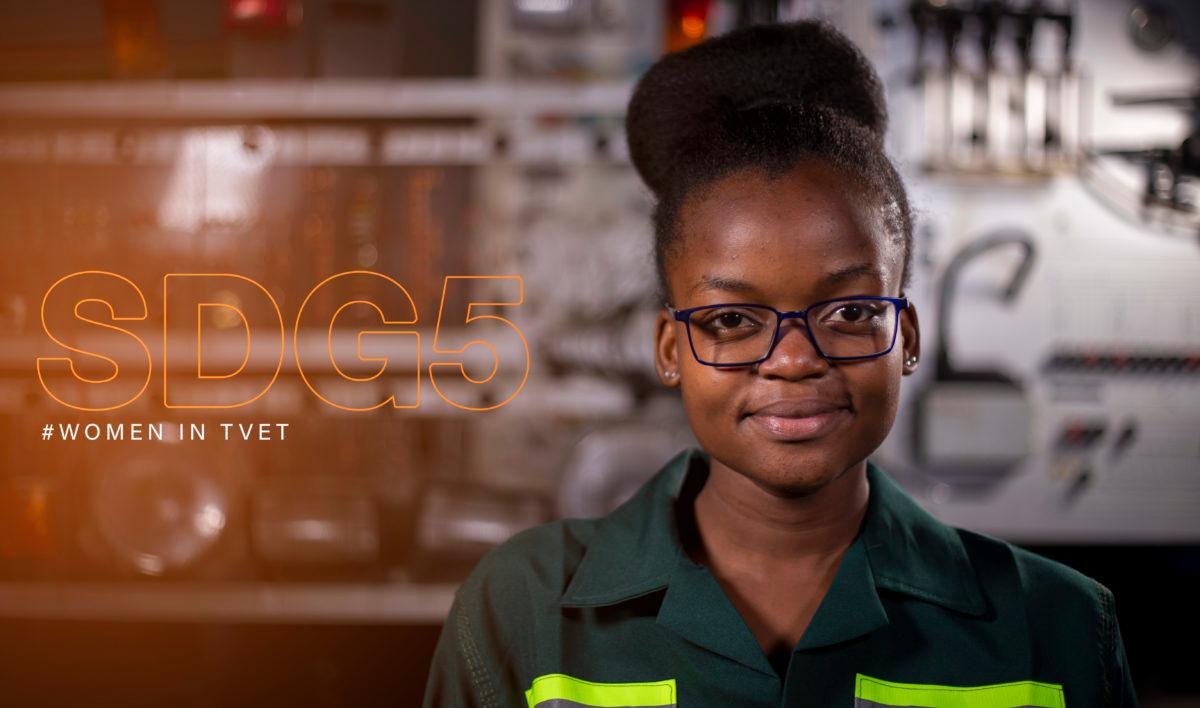Engaging more Women in Technical and Vocational Education and Training
- November 16, 2021
- By Kafula Chanda
Globally, education has been regarded as the key to attaining sustainable development, with TVET serving as the master key.

TVET is the most feasible training program for developing a cadre of creative and inventive persons with the necessary entrepreneurial potential for long-term growth. It is essential that a large proportion of the Zambian populace gets exposed to TVET.
Despite having the capacity to contribute to sustainable development, the majority of women are misrepresented in education and vastly underrepresented in TVET, leaving them with minimal skills.
Unfortunately, most Zambian women’s access to technical and vocational education and training has remained limited. The stereotypical views support the perception that women cannot perform in STEM, Science, Technology, Engineering and Mathematics. This makes it far more difficult for them to engage in today’s evolving TVET sectors and continues to disadvantage them.
Thus, it is the aim of the ZAMITA Public Private Development Partnership PPDP project that young women are inspired to participate in TVET, if Zambia is to achieve sustainable development.
In phase I of the project, the academy trained over 680 students in heavy equipment engineering at Northern Technical College (NORTEC) with a 13% percent increase in female enrolment from 1%. The training enabled young people to realize their full potential and was warmly received in the extractive industry.
As a result, since the project’s expansion to serve the country’s workforce development in the transportation sector, the academy has placed a greater emphasis on the need to bring similar developments from phase I into phase II and help to close the gender gap in the automotive engineering programmes at NORTEC by increasing female participation and creating enrollment opportunities for the vulnerable and disabled.
To address this gap, UNIDO in collaboration with NORTEC, launched a campaign in Zambia to reach 10 provinces and raise awareness about student involvement. This intended to help the government provide bursaries to Zambia’s most vulnerable and underprivileged youth in order to improve their participation in TVET courses at NORTEC, the academy’s host institution.
Due to Covid-19, the project was only able to visit six (6) target sites districts/chiefdoms across Zambia’s provinces and execute gender-focused enrolment awareness activities in these rural areas.
A total of 1000 applications were received at NORTEC from these chiefdoms, and 180 students were shortlisted for the May intake, with 24 percent female representation as of September 2021.
This initiative expands on the Zambian government’s pledge to grant 500 bursary spots to ZAMITA beneficiaries.
Chalwe Musonda, a female beneficiary now studying Automotive Engineering Trade Test Level III, feels that workshop practice is the most fun aspect of her curriculum. “I would spend a whole day in the workshop simply exploring stuff.”
Chalwe recalls that her parents and family persuaded her not to pursue automotive engineering since it is dominated by males before she enrolled in the academy. She applied because she knew what she wanted and wanted to be distinct from the rest of her family. “I would tell my fellow females not to be disheartened; if you know what you want, go for it,” she said.

Enala Msimuko, another ZAMITA student who is pursuing a diploma in Automotive Engineering and was raised by a single mother, believes that women should gather strength, stand up, and think that they can do engineering courses. “I am grateful for the chance to attend this institution. Because my parents couldn’t afford to pay my college, I never imagined I would have a shot. But when this chance arose, I was ecstatic, and I am now happy to be a part of this academy.”
Enala believes that participating in the new curriculum would improve her life and drive her to new heights. The portion of her program that she enjoys the most is disassembling and reassembling engines. “That’s a lot of fun for me,” she concluded.
“I am thankful to ZAMITA because I come from a family that lives below the poverty line, which means we can hardly afford most of our basic requirements, and ZAMITA arrived at a time when my family was losing hope that I would be able to pursue tertiary education. ZAMITA and its partners, the Swedish Embassy in Lusaka, the Government of Zambia, Volvo Group, and UNIDO, provided me with this chance to gain skills.” added Emmanuel Sampa, who is pursuing an Automotive Engineering diploma.

The academy has been implementing rigorous staff development programs in order to improve teaching methodologies and trainer abilities. Since the academy’s phase II, a total of 27 staff development programs have been completed successfully. Local on-the-job training (OJT), international OJT with Volvo Trucks South Africa, Training of Trainers (TOT) with local experts, Virtual TOT with international experts, Pedagogical Trainings, Soft Skills programs on smart interactive screens, and e-learning programs are among the trainings conducted.
The staff development training sessions have involved a total of seventeen (17) NORTEC teaching staff members from the automotive and heavy equipment departments.
Two NORTEC trainers recently completed a 10-day On-the-Job Training with Volvo Trucks in Johannesburg, South Africa, from the 18th to the 29th of October.
The project continues to organize staff development programs to enable trainers to expand their expertise needed on advanced tools and equipment to effectively perform on the modern automotive technology and its systems and ultimately deliver effective lessons to students.
The establishment of a link with Volvo’s Truck division in South Africa for the purposes of technology transfer, curriculum updating, infrastructure provision, and staff development training has enabled the ZAMITA to empower more female learners with skills previously thought to be reserved for men.


NORTEC Trainers (L) Fred Wishikoti and (R) Victor Mwansa at Volvo Trucks SA Workshop